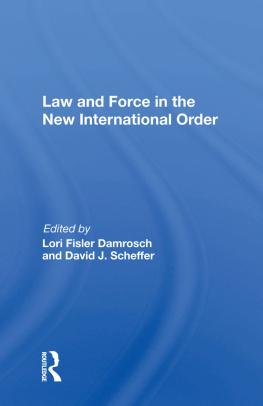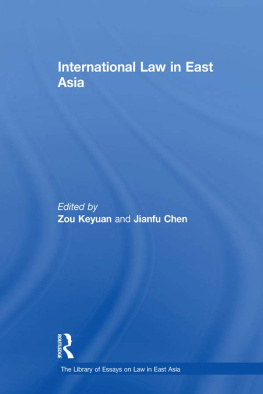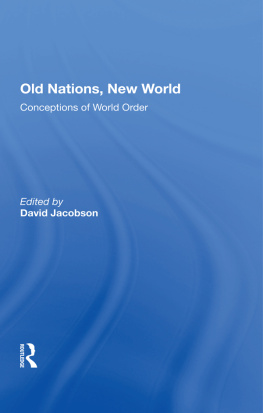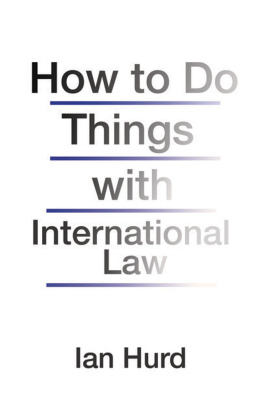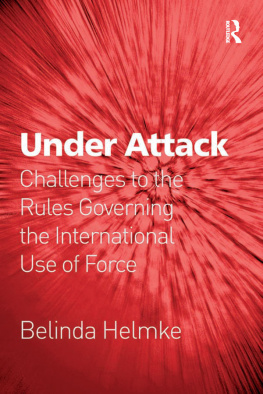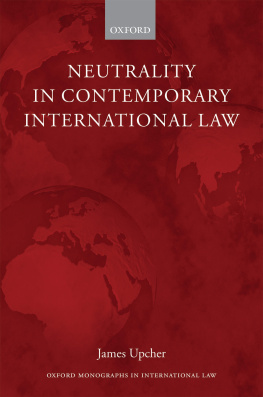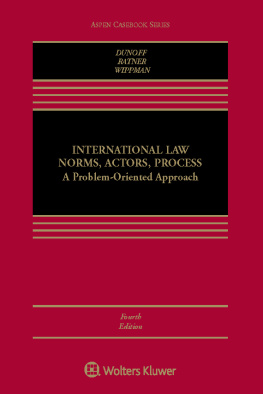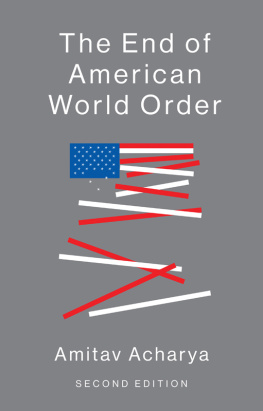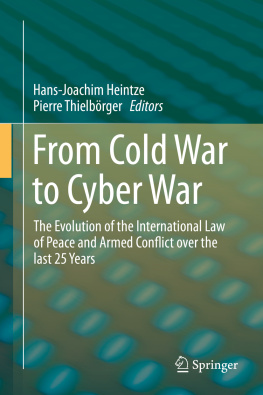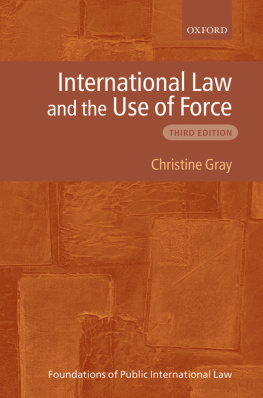First published 1991 by Westview Press, Inc.
Published 2018 by Routledge
52 Vanderbilt Avenue, New York, NY 10017
2 Park Square, Milton Park, Abingdon, Oxon OX14 4RN
Routledge is an imprint of the Taylor & Francis Group, an informa business
Copyright 1991 by the American Society of International Law
All rights reserved. No part of this book may be reprinted or reproduced or utilised in any form or by any electronic, mechanical, or other means, now known or hereafter invented, including photocopying and recording, or in any information storage or retrieval system, without permission in writing from the publishers.
Notice:
Product or corporate names may be trademarks or registered trademarks, and are used only for identification and explanation without intent to infringe.
Library of Congress Cataloging-in-Publication Data
Law and force in the new international order / edited by Lori Fisler Damrosch and David J. Scheffer.
p. cm.
Includes index.
ISBN 0-8133-1356-2 ISBN 0-8133-1357-0 (pbk.)
1. Aggression (International law). 2. Intervention (International law). 3. Self-defense (International law). I. Damrosch, Lori F. (Lori Fisler). II. Scheffer, David J.
JX4471.L39 1991
341.6'2dc20
91-15229
CIP
ISBN 13: 978-0-367-00438-5 (hbk)
The end of the Cold War has focused new attention on international law, especially in areas that previously seemed to elude legal control. During the long decades when the United States and the Soviet Union were constantly struggling through proxy wars, covert activities, and projections of power around the globe, many questioned whether international law could ever be brought to bear to regulate such behavior. And if the superpowers were acting in many respects as if law had little relevance to their activities, it was hardly surprising that other actors questioned its relevance as well.
Momentous events of recent years have shown the tremendous potential for developing and applying international law, even in the area that has always presented the greatest challengethe use of force. When the Iraqi army invaded and occupied Kuwait in August of 1990, the United States and the Soviet Union together with other major powers took a united position on the relevance of international law, its normative content, and its enforceability through decisions of the U.N. Security Council. This was the first time since the adoption of the U.N. Charter in 1945 that the five permanent members had acted in concert to enforce the international law governing the use of force against an aggressor state.
The groundwork for many of the recent changes in the outlook for international law was laid by changes in the long-held positions of the Soviet Union with respect to both law and foreign policy. Among the initiatives launched by Mikhail Gorbachev was the idea of the primacy of law over politics, in the international sphere as well as domestically. This idea formed one of the cornerstones of the "new political thinking" that has dominated Soviet foreign policy in recent years.
To American international lawyers, the idea that law should govern foreign relations was not a new one. On the contrary, U.S. leaders had pressed for this idea beginning in the late nineteenth century, though not always consistently. And there were many occasions when the actions of the U.S. government seemed out of compliance with the rules of law that the United States itself had promoted. On such occasions, the claim that law should not bind one superpower alone was frequently heard.
By the end of the 1980s, many American and Soviet international lawyers seemed at least to be speaking the same language about the nonuse of force to achieve ideological aims. The Soviet Union had definitively repudiated the Brezhnev Doctrinethe argument that had been put forward in 1968 to justify the invasion of Czechoslovakia in the interests of the preservation of socialism and the promotion of class interests. The Soviet parliament had condemned both that invasion and the 1979 invasion of Afghanistan as violations of international law, thus bringing the Soviet view in line with long-held Western positions. The Reagan Doctrinewhich at its core sanctioned U.S. military support for insurgencies against totalitarian governments being supported with arms from the Soviet Unionwas not officially repudiated by the Bush administration, but the doctrine became increasingly irrelevant to U.S. foreign policy as Soviet expansionism contracted and the regional conflicts of the 1980s moved toward peaceful resolution. Yet in December of 1989 the United States invaded Panama, putting forth claims that bore at least some similarity to the discredited Brezhnev Doctrine. Could military force be applied for the sake of democracy, when its application for the preservation of socialism was thoroughly rejected? And in the Soviet Union, the central government's use of force to confront independence movements within some of its own republics raised fresh concerns that the Brezhnev Doctrine had risen from the dead to haunt national and sub-national groups struggling to assert sovereignty.
These issues and many more bearing upon the relationship of international law and the use of force following the Cold War were the focus of a joint U.S.-Soviet Conference on International Law and the Non-Use of Force held in Washington, D.C., on October 4-6, 1990. The conference was organized by the American Society of International Law and supported by the Ford Foundation. Approximately 100 international lawyers, scholars, government officials, and practitioners attended the conference. Leading authorities on international law in the United States and the Soviet Union delivered papers and commentaries on a wide spectrum of issues relating to the relationship between international law and the application of armed force to achieve political, military, economic, or humanitarian objectives.
The present volume is based on the conference. It constitutes the first published result of a collaborative effort by U.S. and Soviet experts to rethink international law in light of new political conditions. Special attention is given to the Iraq-Kuwait crisis, which was in progress at the time these papers were in preparation.
criticize the Chayes thesis on the relationship between U.N. action and unilateral actions by states; they also address other issues concerning the use of force in self-defense.

